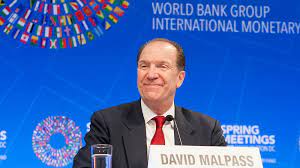The World Bank Group President, David Malpass, has predicted that developing economies would experience moderated growth of about 3.1% this year compared to the 4.1% growth recorded in 2022.
Malpass made this projection on Tuesday during a Media Call at the ongoing World Bank/IMF Spring Meetings in Washington D.C, United States.
The development finance banker linked the envisaged slowdown in the developing countries to rising energy prices and recent challenges in the banking system that hold great potential to dampen activities in the affected countries and globally.
According to him, in recent months the cost of oil has risen above $80 per barrel just there is a slowdown of economic activities due to banking sector’s stress and pressures associated with surging inflation rates in many countries.
The banker said: “Oil prices have jumped back above 80 dollars/barrel. The recent banking sector stress dampens activities and inflation pressures persist.
“If we look at developing countries excluding China, we expect a slowdown to about 3.1 per cent in 2023 from 4.1 per cent in 2022.
“The concern in our recent reports is that slow growth will persist for years for many developing countries, increasing fiscal stress and debt problems.
“It is a combination of weak investment, higher interest rates, and relatively weak growth in the advanced economies”, he added.
Noting that slow growth is usually associated with inflation, currency depreciation, rising debt costs, and the collapse of international reserves, among other factors, Malpass pointed out that “these problems are severely constraining future growth and deepening inequality and fragility for developing countries.
“I travelled to West Africa in March, where we are working to provide support in the face of these problems.
“Looking at the big picture, I will mention two problems. First, the normalization of interest rates after an artificial decade near zero”, he added.
Malpass identified the second problem as the continued absorption of the available global capital by a narrow group of advanced economies with extremely high level of public debts, which he called ‘sinkholes’.
He lamented: “To make matters worse, their populations are ageing rapidly and the peace dividend of the 1990s was used up.
“However, the likelihood is a long period of slow growth, asset reprising, and capital moving in the wrong direction.
“Moving toward a narrow group of government and big corporations rather than to the small businesses and working capital that could add to global growth”, he stressed,






